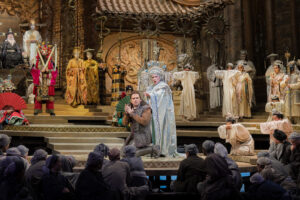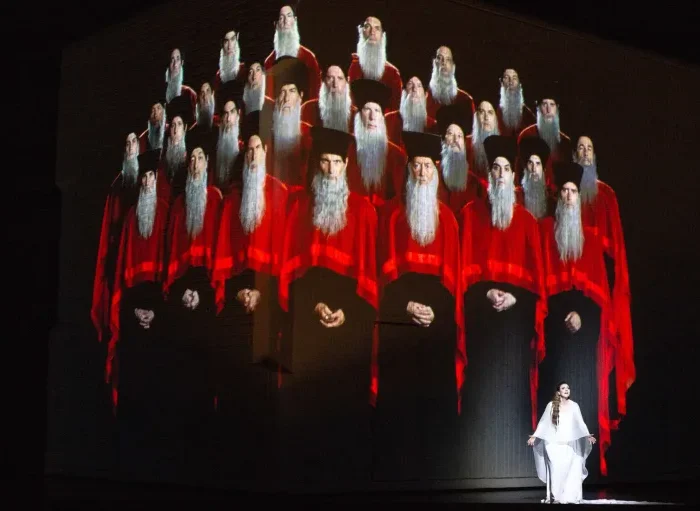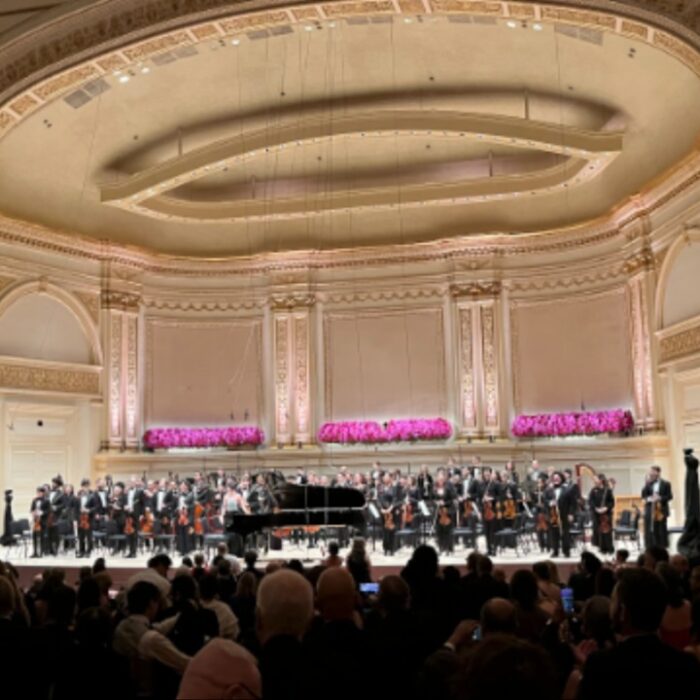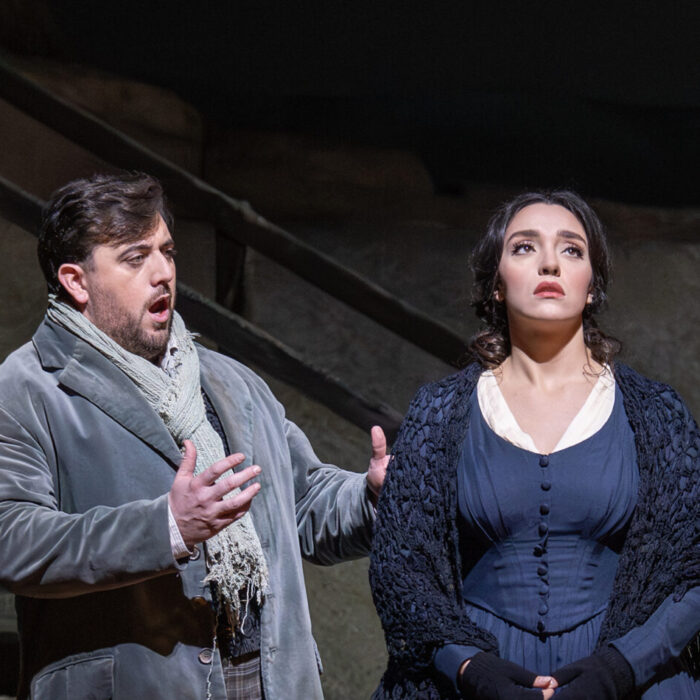
Metropolitan Opera 2025-26 Review: Turandot
By David SalazarThe Franco Zeffirelli production of “Turandot” at the Metropolitan Opera is iconic and a known quantity at this juncture, so I won’t be rehashing much about it here. But in watching the Sept. 30, 2025 performance of the Puccini opera, I was reminded about its enduring power.
Part of that mainly came from the audience with whom I witnessed the experience. All around me, I heard comments from audience members who were either watching their first opera at the Met, or watching this production for the first time. Those who have experience with the production know the hits by now. The big one, of course, is when the second scene of Act two comes to fore and we see the great palace in all its splendor. I’ve seen it countless times so the reveal has had a bit of diminishing returns effect on me. However, hearing others predictably gasp and awe at the sight for the first time never gets old. The production remains an assault on the senses and even if there are moments where the business onstage can create some confusion, there’s no doubt that this is exactly the kind of theatrical experience that thrives in this cavernous venue, especially with a strong cast.
A strong cast is exactly what the Met delivered on this occasion.
The big headliner was Michael Fabiano as Prince Calaf. Fabiano’s tenor is optimal for the role and while he took a few moments to warm up on this evening, by the time he got up to Calaf’s first big solo,”Non piangere Liu,” he was in almost peak form. The legato line throughout this solo was polished and gentle, shifts into the passagio on “Non lo lasciare” smooth. A lot of tenors trumpet through this section, but Fabiano managed a fine line between softness and force. As a result, the passage had a tenderness and even yearning quality that added to its riveting nature. The only blemish, to my ears, was Fabiano’s choice to hook up from the F on “Che” to the climactic high B flat before then adding the “Non.” The result is that he split the B flat into two notes, creating a bit of a jarring effect. He did something similar on the final “Turandot” at the end of the Act, splitting the high A on two syllables as opposed to the one written in the score. I am aware that not everything has to be “come scritto,” but it stood out because it was not only musically odd, but also because Fabiano wouldn’t do anything like this again for the remainder of his overall stellar performance.
The Riddle Scene is, in my view, the best scene in this opera and one of the best in all of opera, full stop. But oftentimes, tenors take it for granted in this production. They play it like the victory is a foregone conclusion and there’s no reason to fret about Calaf’s fate. Fabiano, who seemed determined to play Calaf from the get-go as a prince in full of whimsy and hope, looked increasingly nervous throughout. His Calaf’s confidence wavered and during the third riddle, he dropped to his knees as if surrendering. Conversely, when Calaf found the answers, Fabiano’s tenor was even more stentorian in its execution with the final “La mia vittoria ormai t’ha data a me! Il mio fuoco ti sgela: Turandot!” particularly aggressive and powerful in its execution. You could sense the catharsis in his delivery of this final answer, especially the accented “Turandot.” To go from that explosion of vocal power to the softer colors and sublime legato of “Il mio nome no sai” was all the more visceral and engaging.
Fabiano was also fantastic in “Nessun Dorma,” his sound resonating amply in the space while retaining sweetness. He managed a blissful diminuendo on “splenderà” at the end of the aria’s A section. At the climax, the tenor’s voice exploded into the space gloriously, climaxing with that iconic and thunderously executed B natural on “Vincerò.” The audience erupted into applause before the orchestra had even finished the coda. While Calaf gets a few vocal interjections during the Liù scene, Fabiano’s strongest contribution to this dramatic passage was the moment right after her death when he took Timur, interpreted by Vitalij Kowaljow, in his arms and hugged him. It’s possible that this has always been in the staging, but Fabiano’s intensity in this moment made it feel like something completely new and further enhanced his interpretation of the character. Fabiano showed off his greatest vocal contrast during the final “Principessa di morte” where he was arguably at his most aggressive, trumpeting through those opening stanzas before bringing his voice back to its softest during “Oh! Mio fiore mattutino!” before eventually letting loose with even more waves of sound as he proclaimed “Io son Calaf, figlio di Timur!” During these final moments of the duet, with the orchestra at its most pulsating, Fabiano’s tenor projected fiercely into the space alongside soprano Angela Meade’s fortissimo.
Speaking of Meade, she had a standout night. “In questa Reggia” is a nail biter. Not only is this the soprano’s first opportunity, after being built up for an act and a half, to make an impression, but she must do so singing some of the most challenging music written for soprano. And even once that’s done, the soprano still has to conquer passages that constantly expose her high range against a sea of sound from the orchestra. While there were a few high notes that were slightly flat here and there, there is no denying that Meade executed some of Puccini’s most challenging vocal writing with bravura and elegance. The opening lines of “Principessa Lou-u-Ling, ava dolce e serena” were soft, allowing the soprano to build to the ensuing vocal outbursts. These contrasts also allowed Meade to build a far more nuanced performance where there were hints of vulnerability and yearning. This was most noticeable in the desperate “Padre augusto! No! Non gettar tua figlia nelle braccia dello straniero!” And even when tasked with raging against the orchestra in subsequent passages or even during the riddle scene, Meade’s Turandot expressed fear over her impending destiny.
That fear was most palpable at the end of the opera when Turandot, having essentially motivated Liù into suicide, has to reckon with Calaf’s victory. I’ve always had issues with Calaf’s behavior toward Turandot. She doesn’t want him or anyone yet he insists that he will have her and even forces a kiss on her that suddenly “transforms her.” Yes, it is a fairy tale but even Puccini, a known womanizer, never felt like he had figured out the right solution to make the dramatic shift. Safe to say that Alfano, whose ending of the opera is canonical, didn’t come close either. I bring this up because Meade’s more vulnerable presence, despite Fabiano’s more sympathetic turn, somehow made that troubling dynamic all the more present in their duet. While Fabiano’s Calaf pursued her intensely, Meade constantly shifted away, trying her utmost to protect herself from him. Vocally, she maintained the similar vitality she displayed in the second act, but her singing was less metallic here and had a warm hue, especially after the fated kiss. In the opera’s climactic moments, her soprano soared above the brass-heavy sound. Her final “Il suo nome è… Amor!” rang vigorously into the space, capping a strong performance from the soprano.
As Liù, Masabane Cecilia Rangwanasha delivered a gorgeous turn. While there were some rougher edges in the phrasing of “Signore, ascolta!” her final phrases, particularly the final “Ah, pietà!” featured a glorious, floated high B flat. Her final scene was nothing short of awe-inspiring with her declaration of “Principessa, l’amore” delicate and yet forceful. “Tanto amore, segreto e inconfessato” was delivered with soft tones, drawing the listener in. Here to, her high notes floated at the apex of the aria, the G on “del mio amore.” “Tu, che di gel sei cinta” was gentle but pointed and you could feel her voice growing stronger with each phrase, Rangwanasha expressing Liù’s determination and strength as the inevitability of her death approached. The F natural on “gliocchi per non vederlo più” got a hair-raising crescendo to close out the line.
As Timur, Vitalij Kowaljow displayed a potent bass. He particularly stood out in the opera’s final moments when Timur damns all the onlookers for Liù’s death. Declaring “L’anima offesa si vendicherà!” his voice boomed aggressively into the space.
As Ping, Pong, and Pang, Hangung Yoo, Tony Stevenson, and Rodell Rosel were a perfect complement for one another. Yoo had a standout moment during the gorgeous “Ho una casa nell’Honan.” Whereas his singing projected a darker sound throughout Act one and most of the start of the Act two scene, here he displayed a lighter, warmer quality with seamless legato.
Le Bu also displayed a vigorous bass-baritone during his famed “Popolo di Pekino,” while Thomas Capobianco’s tenor shone resolutely as he implored Calaf to back off from his attempted conquest.
In the pit, Carlo Rizzi and the Metropolitan Opera Orchestra matched one another quite well throughout the opera’s dramatic twists and turns. The opening lines had muscularity that would be matched in the opera’s most explosive moments, especially throughout Act two. And yet, always managed to strike a sturdy balance with his singers, allowing Meade and Fabiano, in particular, to have ample space to ride over the ensemble’s massive sound.
On the whole, Zeffirelli’s production of “Turandot” will always be a marvel, but the cast assembled here is the reason to check out the revival.


